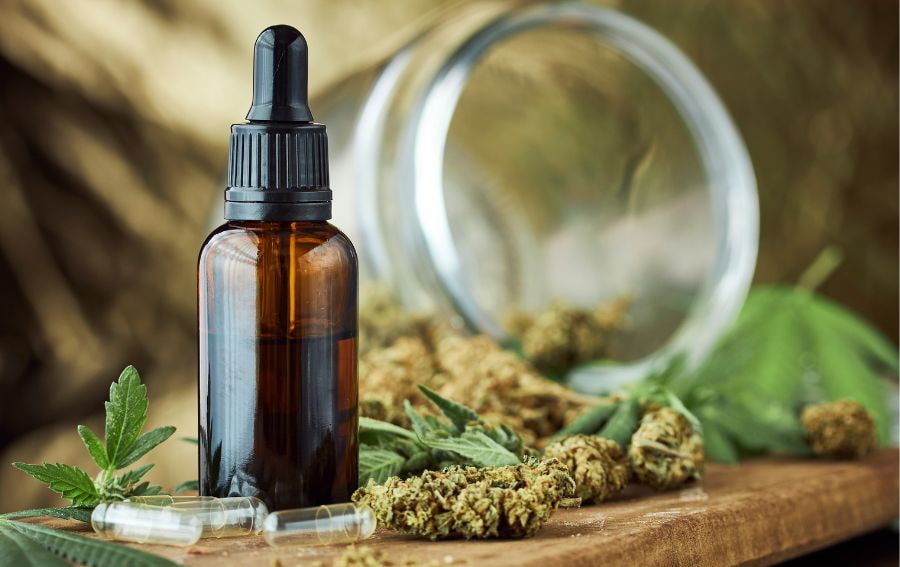
CBD Breakdown: Is CBD Oil Addictive?
If you’re considering using CBD oil as a treatment for any condition, it’s natural to wonder whether it’s addictive.
After all, addiction is a serious issue affecting many people worldwide. This article answers the question of whether CBD oil is addictive and explains the potential benefits of using CBD oil.
Curious about this information? Keep scrolling.
Understanding CBD Oil
Before we dive into the crux of the matter, let’s first take a closer look at CBD oil. CBD, or cannabidiol, is a compound found in cannabis plants. Unlike THC, another compound found in cannabis, CBD does not produce “high” or psychoactive effects. This means CBD oil doesn’t give the same euphoric sensations that marijuana does.
CBD oil is typically made by extracting CBD from the cannabis sativa plant, then diluting it with a carrier oil like coconut or hemp seed oil. It’s available in various forms, including tinctures, capsules, and topical creams.
Is CBD Addictive?
CBD, or cannabidiol, has been gaining popularity for its potential therapeutic benefits. However, one of the most common questions people have is whether or not CBD is addictive. The short answer is no, CBD is not addictive.
Unlike THC, the psychoactive compound found in marijuana, CBD does not produce the same “high” or euphoric effects that lead to addiction. THC binds to receptors in the brain and activates the reward system, which can lead to compulsive drug-seeking behavior. Or cannabis addiction, as it’s popularly called.
Conversely, CBD doesn’t stimulate the release of dopamine, the neurotransmitter associated with pleasure and reward, in the same way, that drugs like cocaine and opioids do.
Simply put, marijuana addiction is a usual occurrence hence the high regulation by Federal law. Cannabidiol is nothing like it.

World Health Organization (WHO) confirms that “CBD exhibits no effects indicative of any abuse or dependence potential.”
The Journal of Drug and Alcohol Dependence also published a study proving CBD has the same dependence level as a placebo pill.
Studies have shown that CBD may even be an effective addiction treatment. A 2019 study published in The American Journal of Psychiatry found that CBD reduced cue-induced cravings and anxiety in people with heroin addiction.
While CBD addiction isn’t a norm. But it’s still important to use it responsibly. For instance, you must choose a quality product from a reputable manufacturer and follow the dosing instructions on the label.
How CBD Oil Treats Addiction
While CBD oil is not addictive, it may help treat drug addiction. Addiction is a complex disease that affects millions of people globally. Whether it’s an addiction to drugs, alcohol, or other substance abuse, it devastates individuals and their families.
Traditional treatments for addictive behaviors often involve medication and therapy. But CBD offers a natural, non-addictive alternative that may be even more effective.
For one, research shows it may limit the possibility of developing cocaine use disorder and assuage drug cravings.
One of how CBD may help substance use disorders is by reducing the cravings accompanying withdrawal. When a person stops using drugs or alcohol, their body goes through a period of adjustment that can be highly uncomfortable.
This is because the brain has become accustomed to the presence of the substance and craves it when it’s not there. CBD reduces these cravings and makes the withdrawal process more manageable.
Another way CBD may help treat addiction is by lowering anxiety and depression. Many people use drugs or alcohol to cope with these difficult emotions, which only exacerbates the problem.
CBD has a calming effect on the mind and body, which can help reduce anxiety and depression, making it easier for people to stay sober.
Finally, there are no extreme public health-related problems associated with it.
Potential Benefits of CBD Oil
While there’s still much to learn about CBD oil, evidence suggests that it may help treat various conditions.
Here are just a few potential benefits of pure CBD oil:
Pain Relief
One of the most common reasons people turn to CBD oil is for pain relief. CBD contains anti-inflammatory properties, which can reduce pain and swelling. It may also help relieve neuropathic pain caused by damage to the nerves. Consequently, it may be helpful for conditions such as arthritis, multiple sclerosis, and chronic pain.
Anxiety and Depression
CBD oil benefits people struggling with anxiety and depression. Study proves that it has a calming effect on the mind and body. This helps reduce anxiety and improve mood. Thus, it’s a reasonable treatment option for those with social anxiety or post-traumatic stress disorder (PTSD).
Epilepsy
The FDA has approved Epilepsy CBD oil for treating two rare severe forms of epilepsy, Lennox-Gastaut syndrome and Dravet syndrome. These conditions are challenging to treat with traditional medications. Still, CBD reduces some patients’ frequency and severity of seizures.
Skin Health
CBD oil may also improve your skin. Having anti-inflammatory properties, it can reduce acne and other skin conditions. It also limits signs of aging like wrinkles and fine lines.
Addiction
Cannabidiol is a great addiction treatment. It has been proven to reduce drug-seeking behavior in rats and may curtail cravings in humans.
Side Effects of CBD Oil
While CBD use is generally considered safe, there are possible side effects to be aware of. Here are a few things to keep in mind:
Drowsiness
One of CBD oil’s most common side effects is drowsiness. It has a calming effect on the mind and body. Hence, it might make you feel relaxed and sleepy. This side effect is more common at higher doses and may be more pronounced in people new to CBD.
Dry Mouth
Another common side effect of cannabidiol is dry mouth. CBD lessens saliva production, leaving your mouth feeling dry and sticky. This is typically mild and can be relieved by drinking water or chewing gum.
Changes in Appetite
Furthermore, it may affect your appetite. Some people report an increase in appetite, while others report a decrease. But a change in appetite is more pronounced when using CBD oil for epilepsy or other medical conditions.
Low Blood Pressure
Cannabidiol CBD may cause a drop in blood pressure, which can cause lightheadedness or dizziness. Patients taking high doses of CBD or who have low blood pressure are more likely to experience this.
Drug Interactions
Finally, it may interact with other medications, including blood thinners and antipsychotic medications. This can increase the risk of side effects and may require a change in dosage or medication.
Conclusion: Should You Try CBD Oil?
Ultimately, CBD oil is not addictive, but it’s possible to become psychologically dependent. If you’re considering cannabidiol, talk to your healthcare provider to determine whether it’s right.
They can develop a treatment plan that’s safe and effective.
Although CBD products are generally safe for consumption, stay cautious while using hemp-derived CBD products.
